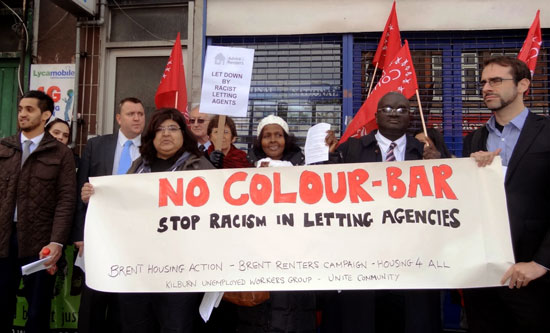
The systemic racism which Black and Minority Ethnic (BME) people1 face throughout the housing sector in Britain is typically not reported. When racism does receive media attention, it is often only the prejudices of private landlords which are judged to be of public interest. Media outlets followed the story of the notorious Fergus Wilson, owner of hundreds of properties in Kent, who recently lost his court case against the Equality and Human Rights Commission for instructing his letting agents not to accept Indian or Pakistani applicants (Sky News, 8 November 2017). A three-year injunction was handed down – a slap on the wrist. But discrimination by landlords is only part of the story, as shown by the government’s own Race Disparity Audit, published in October 2017.
The Audit reveals extensive racial inequality, which infects the housing sector across both private and social housing, across the country:2
- Home ownership is the norm for White British households, with two out of three households owning their home either outright or with a mortgage in 2015/16, compared to only two in five households from all other ethnic groups combined. This was true for all regions of the country, all socio-economic and income bands, and all age groups. Fewer than one in four African, Arab and Mixed White and Black African householders were owner-occupiers.
- 16% of White British households rent from social landlords and a further 16% from private landlords. The corresponding figures for all other ethnic groups are 22% and 37% respectively.
- Social housing is used less by White British people than by people of other ethnicities. Those most likely to use social housing were from the African, Caribbean, Other Black, Bangladeshi, Arab, Irish and mixed groups (with the exception of the ‘Mixed White and Asian’ group). Overall, of the 3.9 million households in the social housing sector, 79% were White British, compared to 83% of all households in England, showing that BME people are overrepresented in social housing use.
- BME households spent a higher proportion of their income on rent than White British households, regardless of whether they rented from a social or private landlord, and regardless of their socio-economic group or income band.
- Pakistani households were ‘more likely’ (the audit does not specify how much more likely) to live in ‘non-decent’ homes than White British households. Overcrowding was more common among BME households in general, but affected 30% of Bangladeshi households, a far higher proportion than of White British households (2%).
The findings on quality of housing are corroborated by other studies. For example, the Runnymede Trust reported in 2010 that most children who live above the fourth floor of tower blocks in England are Black or Asian.3 This is especially significant given the greater fire risk of living on higher floors, and in light of the 60 tower blocks in England which were found to have combustible cladding that fails safety tests.
The Audit’s notes on homelessness are carefully massaged as they only cover those households which were ‘accepted’ as statutorily homeless by English local authorities. To qualify for this status, a household must not only be considered ‘unintentionally homeless’, but also ‘vulnerable enough to be owed secure, settled accommodation’ (isn’t everyone owed that basic right?). In addition to the 59,100 ‘unintentional priority need’ homelessness acceptances in 2016/17, there were almost 10,000 deemed to be ‘intentionally’ homeless, and almost 20,000 homeless but not in ‘priority need’ – the ethnicities of these groups are not recorded.4 A growing number of homelessness acceptances are for BME people – 33% of the total, almost double what it was 20 years ago. As the crisis of capitalism has deepened, the weight of its failing structure shifts more heavily onto some than others.
The director of Birmingham-based charity the Human Cities Institute, Kevin Gulliver, argues one solution is to develop Britain’s small BME housing sector, made up of specialist BME housing associations, pointing to higher rates of social lettings to ethnic minority applicants by such associations, and a higher proportion of BME senior staff.5 But the problem goes beyond the actions of individual bigots in the housing industry: systemic, wide-reaching racial inequality is the inevitable product of imperialism, and a capitalist housing sector will always fail to meet the needs of the working class, whatever the ethnicity of those in its upper ranks who direct it and profit from it. To defeat racism, only socialism will do: we must demand housing built for need, not for profit.
Will Harney
- All terminology for ethnic categories in this article is taken from the source materials below.
- ‘Race Disparity Audit: summary findings from the ethnicity facts and figures website’, Cabinet Office, October 2017.
- ‘Impact Report 2010’, Runnymede Trust 2010.
- www.gov.uk/government/statistical-data-sets/live-tables-on-homelessness.
- Deep roots, diverse communities, dedicated service: the legacy, value and future potential of Black and Minority Ethnic housing organisations in England, Kevin Gulliver and Dawn Prentice, October 2015.
Fight Racism! Fight Imperialism! 261 December 2017/January 2018




